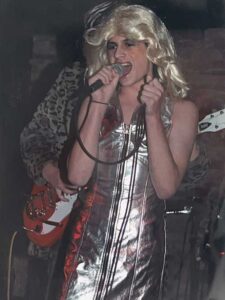Rights of Passage
by Isaac Slone

In the elementary school common room, boys congregated in one area, and girls congregated in another. I stood in the middle, grappling with a painful sense of disconnection. Folding in with either group was impossible. I was alone in noticing the binary division. As a younger person, I felt uncomfortable in my male body. I often wore women’s clothes. I loved borrowing my mother’s red boots. I was interested in exploring and talking about gender identity. Other eleven-year-olds were not. I was confused for a girl, but I didn’t mind. The school psychologist took notice and asked to meet with me to express her concerns that I was deeply disturbed and seeking attention. This I did mind.
It was painful that my peers and the adults at school did not show interest or attempt to understand or think with me about what I was going through. There was no framework imparted at school for what I was experiencing. It was not something my peers grew up with a tolerance for or understanding of. There were few resources for someone my age and seemingly even fewer that took up gender identity outside a conversation about sexual orientation. It was a time when I’d come home from school, throw my book bag to the ground, and scream and cry.
I took refuge in The Rocky Horror Picture Show and Hedwig and the Angry Inch—two staples of queer cinema that the adults in my life considered to be inappropriate for a younger person, further relegating these feelings to a space of something potentially illicit or only to be taken up when I was older. These films were and still are examples of how these feelings were fuel for finding creative expression, community, and a more unconstrained experience of oneself. I had the chance to perform in Rocky Horror and Hedwig at a small rock club when I was thirteen years old, playing the lead drag roles in both. My mom took me to have my corset tailored. She still cites the performances as more important events than my bar mitzvah.
With the help of my analyst at the time and my family, I persevered. Perseverance meant compromising and learning to feel comfortable enough presenting as male solely to feel more socially integrated. The unspoken rationale was kind of like “It’ll be easier and less confusing for everyone else if you suppress this part of yourself.” I don’t fault anyone for that; my journey with this has been less painful than that of many others.
As gender identity and nonbinary identity have recently become more socially acknowledged and discussed in my circles, I have sometimes felt bitter and as though I have moved on from those considerations. As the social current changed, I found myself aligned with the perspective that once perpetuated my sadness. I found myself with defensive thoughts like This is surely just a superficial fad and Why would I use different pronouns for someone who presents enough like their sex assigned at birth? I recognize this bitterness as a negation. It is overwhelming to revisit silenced parts of myself and painful memories of feeling out of control, alone, and different. It was even harder to feel as though others were being met with the kind of understanding and acceptance I longed for and to consider others striving and struggling with coming into themselves authentically. I’m on a new path, working to have a more embodied relationship with these parts of myself.
I also write this piece in response to those who do not believe school is a place to discuss gender identity. If my peers and I had grown up with room for these feelings and questions, made possible in part by the adults we looked to teach us about the world, it undoubtedly would have made a difference. Some attempts at curricula will get it wrong. Conversations about gender identity will provoke anxiety and confusion and require families to discuss difficult things. Contributing this personal narrative feels like a step in that direction.

- Isaac Slone is a psychoanalytic candidate at the Contemporary Freudian Society in New York City. He is also currently training in the three-year Anni Bergman Parent-Infant Program. He received his BA and MA from the New York University Gallatin School of Individualized Study, where he studied the relationship between psychoanalysis, music, and literature. At NYU Gallatin, he was honored with Interdisciplinary Academic Excellence Awards for his undergraduate work on the relationship between narrative theory and concepts of identity formation and his graduate work on psychoanalytic technique and performance studies. He is the director of programming of ROOM: A Sketchbook for Analytic Action. He writes and lectures on James Joyce, the Grateful Dead, and Phish.
- Email: isaac@analytic-room.com
ROOM is entirely dependent upon reader support. Please consider helping ROOM today with a tax-deductible donation. Any amount is deeply appreciated. |




